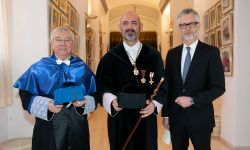
For his scientific achievements in the field of quantum physics, experimental physicist Rainer Blatt received an honorary doctorate from the Complutense University of Madrid on Friday in Madrid. On Wednesday, Blatt was already accepted as a foreign member of the Spanish Academy of Sciences.
In a ceremony held on Friday, the Complutense University of Madrid awarded Rainer Blatt an honorary doctorate for his work and developments in the fields of quantum computation and information, quantum simulation and quantum metrology, which have created the experimental foundations of these disciplines and confirmed the corresponding developments in theoretical physics. "It is a great honor and a great pleasure for me to receive an honorary doctorate from the University of Madrid, one of the oldest and most prestigious universities in Europe and the world," said Rainer Blatt. The Innsbruck physicist was already accepted as a member of the Spanish Academy of Sciences on Wednesday.
Quantum computer pioneer
With his research team, the Innsbruck-based experimental physicist Rainer Blatt has been working on the realization of quantum computers since the mid-1990s. He uses ions that are electromagnetically trapped in a vacuum chamber and cooled down to temperatures close to absolute zero as quantum bits. Besides superconducting circuits, trapped ions are considered the most promising technology for quantum information processing. Today, the physicists led by Rainer Blatt control up to 20 ions and can perform computing operations on them. Soon, they hope to use up to 50 fully controlled ions to advance into computing regions that cannot be reached with conventional computers. The spin-off company Austrian Quantum Technologies (AQT), co-founded by Blatt, is working on the first commercial quantum computer. In addition to the vision of a universally programmable quantum computer, Blatt's work is also laying important foundations for new quantum technologies that will find their way into many areas of life in the coming years and decades. He has already received numerous international awards for his groundbreaking achievements, including the John Stewart Bell Award, the Stern Gerlach Medal, and the Micius Quantum Prize. Last year he was elected to the US National Academy of Sciences.